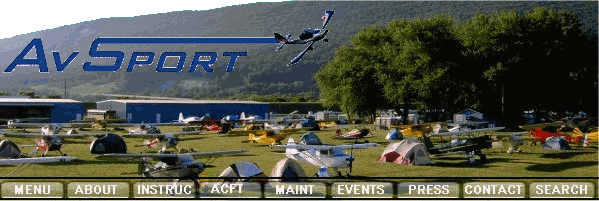
AvSport of Lock Haven -- 353 Proctor Street, Lock Haven PA 17745
Other Instructors' Comments about Accelerated Flight Training

Other Instructors' Comments about Accelerated Flight Training
Mike Bellenir, who works for a large flight school in New York, has conducted quite a few accelerated training programs, with good success. Here are his recommendations:
The biggest problem I've found with accelerated programs is that students will forget things as quickly as they learned them. It is very important, after completing an accelerated program, that the student continues to fly at a similar pace until they get some experience. They should try to do several flights the week after completing the program and then slowly work down to the amount of flying that they plan on regularly doing. Do not let your graduates take any time off after getting their wings! They have to make a big effort to stay current and proficient and should fly with you regularly as well. Remember the one hour a day of study? Your students have to do that much minimum even after they finish the program (reviewing stuff they've already studied). If your students fly and study very regularly even after finishing the program, you are likely to have good success.
Darren Smith, a CFII/MEI/ATP with an excellent flight instruction website, had this to say about accelerated courses in his 2003 book Getting the most from your flight training:
Do they work? Is it the best training alternative for you? Can you absorb the material quickly enough?Accelerated training programs have been around for a long time. All segments of the aviation industry use accelerated training models from Airlines to Corporate Flight Departments to the Military. So we all know it works. The intensity of such training programs nearly guarantees the lessons will last a lifetime. Accelerated programs tend to come with fixed costs so the value of such programs is in your ability to get as much as possible in the allotted time. In addition, the fast pace of such program guarantees that you'll spend less time reviewing previously learned skills.
Within the world of FAA certification, all applicants must meet the PTS requirements. No matter what training program you enter, the result must be the same. How quickly and completely you accomplish the practical skills is entirely up to you.
What's your motivation in considering an accelerated training program? Perhaps you work full-time and tried the one lesson per week method. It works for many but sometimes the weight of daily pressure causes your training effort to be put on the back burner. If this is the case, seek a training program that is structured, efficient, and gets you through the training in the most cost effective way.
Don't be fooled, accelerated programs are hard work and require you to achieve the same knowledge in a short period of time compared to other students who might take six months to do the same thing. Are you ready for the intensity of such programs? Can you commit 8-10 hours per day to such training? Can you make the training program your life for that given period of time? Do you have a disciplined personal commitment that can drive the process? For sure, accelerated programs do not spoon-feed you the information so you must face the task with a driven persistence.
Don't be intimidated however. Accelerated programs, which are organized and complete, will get you through the required skills and material in the shortest amount of time. They tend to be extremely efficient if you are prepared to devote your maximum attention to the curriculum.
The instructor presenting the course benefits also: maximum efficiency of his time, up front payment, high probability of success in training the student, highly motivated student, and a fixed schedule for the duration of the training. The managed training schedule allows a flight instructor to focus on producing the very best, skilled pilot.
The challenges to the student are tremendous and are measured by your level of commitment. Individuals who do not realistically prepare for the level of effort required often want to quit. Have an honest, open discussion with your instructor. He's a professional who understands the challenges you face and is likely to have the techniques to get you past the current hurdle. Ultimately its up to you because the program is what you make it.
This content is Copyright 2002-2010 by Darren Smith. All rights reserved. Subject to change without notice. This website is not a substitute for competent flight instruction. There are no representations or warranties of any kind made pertaining to this service/information and any warranty, express or implied, is excluded and disclaimed including but not limited to the implied warranties of merchantability and/or fitness for a particular purpose. Under no circumstances or theories of liability, including without limitation the negligence of any party, contract, warranty or strict liability in tort, shall the website creator/author or any of its affiliated or related organizations be liable for any direct, indirect, incidental, special, consequential or punitive damages as a result of the use of, or the inability to use, any information provided through this service even if advised of the possibility of such damages.

If you can drive, you can fly!
Copyright © AvSport LLC, a subsidiary of Microcomm Consulting This page last updated 1 January 2024 |
Top of Page |